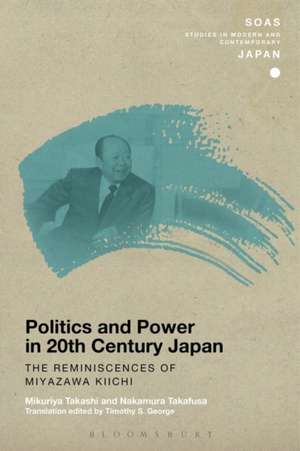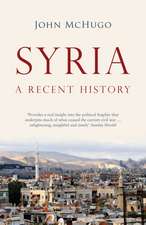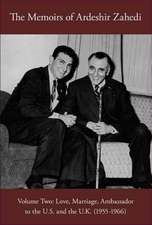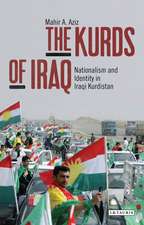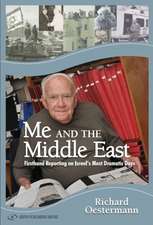Politics and Power in 20th-Century Japan: The Reminiscences of Miyazawa Kiichi: SOAS Studies in Modern and Contemporary Japan
Autor Mikuriya Takashi, Nakamura Takafusaen Limba Engleză Paperback – 25 ian 2017
| Toate formatele și edițiile | Preț | Express |
|---|---|---|
| Paperback (1) | 257.97 lei 43-57 zile | |
| Bloomsbury Publishing – 25 ian 2017 | 257.97 lei 43-57 zile | |
| Hardback (1) | 774.46 lei 43-57 zile | |
| Bloomsbury Publishing – 29 iul 2015 | 774.46 lei 43-57 zile |
Din seria SOAS Studies in Modern and Contemporary Japan
- 21%
 Preț: 218.00 lei
Preț: 218.00 lei - 30%
 Preț: 510.25 lei
Preț: 510.25 lei - 23%
 Preț: 228.76 lei
Preț: 228.76 lei - 22%
 Preț: 231.63 lei
Preț: 231.63 lei - 30%
 Preț: 539.84 lei
Preț: 539.84 lei - 23%
 Preț: 228.94 lei
Preț: 228.94 lei - 22%
 Preț: 256.85 lei
Preț: 256.85 lei - 21%
 Preț: 218.74 lei
Preț: 218.74 lei - 13%
 Preț: 231.89 lei
Preț: 231.89 lei - 30%
 Preț: 540.54 lei
Preț: 540.54 lei - 22%
 Preț: 225.59 lei
Preț: 225.59 lei - 22%
 Preț: 241.15 lei
Preț: 241.15 lei - 13%
 Preț: 259.07 lei
Preț: 259.07 lei - 21%
 Preț: 235.20 lei
Preț: 235.20 lei - 13%
 Preț: 257.97 lei
Preț: 257.97 lei - 30%
 Preț: 597.56 lei
Preț: 597.56 lei - 21%
 Preț: 218.74 lei
Preț: 218.74 lei - 22%
 Preț: 256.95 lei
Preț: 256.95 lei - 30%
 Preț: 540.96 lei
Preț: 540.96 lei - 22%
 Preț: 224.94 lei
Preț: 224.94 lei -
 Preț: 323.56 lei
Preț: 323.56 lei - 30%
 Preț: 656.90 lei
Preț: 656.90 lei - 12%
 Preț: 259.52 lei
Preț: 259.52 lei - 21%
 Preț: 218.18 lei
Preț: 218.18 lei - 22%
 Preț: 256.59 lei
Preț: 256.59 lei - 21%
 Preț: 218.47 lei
Preț: 218.47 lei - 30%
 Preț: 567.75 lei
Preț: 567.75 lei - 13%
 Preț: 250.92 lei
Preț: 250.92 lei
Preț: 257.97 lei
Preț vechi: 331.42 lei
-22% Nou
Puncte Express: 387
Preț estimativ în valută:
49.36€ • 51.67$ • 41.09£
49.36€ • 51.67$ • 41.09£
Carte tipărită la comandă
Livrare economică 31 martie-14 aprilie
Preluare comenzi: 021 569.72.76
Specificații
ISBN-13: 9781350022560
ISBN-10: 135002256X
Pagini: 272
Dimensiuni: 156 x 234 x 18 mm
Greutate: 0.39 kg
Ediția:NIPPOD
Editura: Bloomsbury Publishing
Colecția Bloomsbury Academic
Seria SOAS Studies in Modern and Contemporary Japan
Locul publicării:London, United Kingdom
ISBN-10: 135002256X
Pagini: 272
Dimensiuni: 156 x 234 x 18 mm
Greutate: 0.39 kg
Ediția:NIPPOD
Editura: Bloomsbury Publishing
Colecția Bloomsbury Academic
Seria SOAS Studies in Modern and Contemporary Japan
Locul publicării:London, United Kingdom
Caracteristici
Covers Miyazawa's thought on US-Japanese relations, postwar recovery policies and Japan's involvement in international organisations
Notă biografică
Timothy S. George is Professor of History at the University of Rhode Island, USA.Mikuriya Takashi is Professor at the Open University of Japan.Nakamura Takafusa was a professor at Tokyo University, Ochanomizu Women's University and Toyo Eiwa University, Japan.
Cuprins
The Importance of Miyazawa Kiichi: Translation Editor's IntroductionPreface1. Early Life/ On Completion of the Interviews 2. Experiences before and during World War II: The Japan-America Student Conference and the Heading of Tax Offices 3. The Ministry of Finance after Defeat in World War II4. Negotiations with GHQ: The Dodge Line and the Shoup Tax System 5. Attending the San Francisco Peace Conference6. The Beginnings of Kochikai, and the Anpo Protests7. Ikeda's Visit to America and His Meeting with President Kennedy 8. The Japan-U.S Textile Negotiations9. From the Plaza Accord to the Bursting of the Economic Bubble10. Miyazawa as Prime Minister11. Considering 21st Century JapanEpilogue: On Completion of the InterviewsChronology of Miyazawa Kiichi's Life and Related EventsIndex
Recenzii
Kiichi Miyazawa, prime minister from 1991 to 1993 was at the center of Japanese politics from 1942 when he entered the Finance Ministry until 2003, when he retired from the House of Representatives. No Japanese prime minister was as skilled in English or kept up better on economic matters in the West. He played a key role during the Allied Occupation, in negotiations with the United States during the period of economic tensions. He worked with U.S. presidents from Jack Kennedy to William Clinton. His close relatives included a member of the House of Representatives (his father and nephew), the first Japanese ambassador to China after normalization in 1972 (cousin), governor of Hiroshima (brother). He was especially close to Ikeda Hayato (also from Hiroshima) and Ohira Masayoshi (same faction). As prime minister he approved the visit of the Japanese Emperor to China in 1992. By nature he was modest, honest, straight-forward. We are fortunate that he gave an oral account of his own history, available here in an excellent translation by Timothy George.
Miyazawa Kiichi was one of Japan's most distinguished statesmen from the immediate post-war period until his death in 2007. He occupied several of the most important offices of State, having been Prime Minister between 1991 and 1993, and Minister of Finance for extended periods. His reminiscences, ably translated here by Professor Timothy George, present the experiences, outlook and general philosophy of a liberal and internationalist practitioner of the political arts, who had a major influence on the formation of Japanese economic policy, and represented the moderate wing of the broadly conservative Liberal Democratic Party (LDP). In contrast to the situation since December 2012, where the balance of forces in the LDP have swung towards hard-line nationalism, Miyazawa, having experienced wartime Japan, was at ease with the 'Peace Constitution' and the benefits that cautious and non-provocative foreign and defence policies brought for his country. This book indicates how much has changed, and not necessarily for the better.
Kiichi Miyazawa, prime minister from 1991 to 1993 was at the center of Japanese politics from 1942 when he entered the Finance Ministry until 2003, when he retired from the House of Representatives. No Japanese prime minister was as skilled in English or kept up better on economic matters in the West. He played a key role during the Allied Occupation, in negotiations with the United States during the period of economic tensions. We are fortunate that he gave an oral account of his own history, available here in an excellent translation by Timothy George.
Miyazawa Kiichi was one of Japan's most distinguished statesmen from the immediate post-war period until his death in 2007. He occupied several of the most important offices of State, having been Prime Minister between 1991 and 1993, and Minister of Finance for extended periods. His reminiscences, ably translated here by Professor Timothy George, present the experiences, outlook and general philosophy of a liberal and internationalist practitioner of the political arts, who had a major influence on the formation of Japanese economic policy, and represented the moderate wing of the broadly conservative Liberal Democratic Party (LDP). In contrast to the situation since December 2012, where the balance of forces in the LDP have swung towards hard-line nationalism, Miyazawa, having experienced wartime Japan, was at ease with the 'Peace Constitution' and the benefits that cautious and non-provocative foreign and defence policies brought for his country. This book indicates how much has changed, and not necessarily for the better.
Kiichi Miyazawa, prime minister from 1991 to 1993 was at the center of Japanese politics from 1942 when he entered the Finance Ministry until 2003, when he retired from the House of Representatives. No Japanese prime minister was as skilled in English or kept up better on economic matters in the West. He played a key role during the Allied Occupation, in negotiations with the United States during the period of economic tensions. We are fortunate that he gave an oral account of his own history, available here in an excellent translation by Timothy George.
